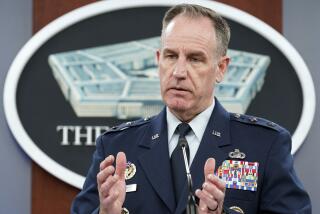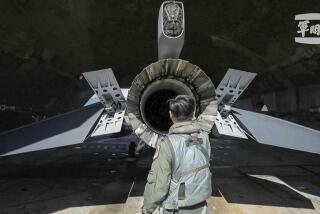Missile parts sent to Taiwan in error
- Share via
WASHINGTON — The U.S. military mistakenly shipped parts from a Minuteman intercontinental ballistic missile to Taiwan, Pentagon officials announced Tuesday in the second incident to come to light in recent months in which nuclear weapons were mishandled.
Pentagon officials said the material sent to Taiwan consisted of four electrical fuses for the ICBM nose cones. The fuses, used to trigger nuclear weapons, do not contain nuclear material.
But experts on nuclear security said the mistaken transfer showed a serious deterioration in the safeguards and controls that the U.S. military has over its nuclear warheads.
“This is really unbelievable,” said Joseph Cirincione, president of the Ploughshares Fund, which advocates reducing the number of nuclear weapons. “If the Russians had shipped triggers to Tehran, we would be going nuts right now.”
U.S. officials anxiously notified China of the error, but experts did not expect Beijing to react with alarm because of long-standing U.S. policies against arming Taiwan with nuclear weapons.
Tuesday’s disclosure came on the heels of an incident last year in which six nuclear warheads were mistakenly flown across the country on a B-52.
Cirincione, a longtime congressional military expert, said the new incident suggests nuclear weapons have become less important to the military than during the Cold War. However, he said, thousands of weapons still must be protected and maintained. “We don’t need these weapons anymore, and if you leave them lying around, bad things are going to happen,” he said.
Defense Secretary Robert M. Gates, after being notified Friday about the shipment, ordered an investigation. An earlier query ordered by Gates into the mislaid warheads criticized the military for losing its focus on its nuclear weapons mission.
The Pentagon learned last week of the improper shipment -- which occurred about August 2006 -- from the Taiwanese government, officials said.
Taiwan had purchased spare batteries for helicopters. The Defense Logistics Agency sent four shipping containers that officials thought contained the batteries, but that actually held the fuses. The Air Force shipped the fuses in 2005 from F.E. Warren Air Force Base in Wyoming to a Utah warehouse operated by the logistics agency, a separate government unit. Officials said they did not know whether the triggers had been mislabeled by the Air Force or improperly stored in an unclassified warehouse by the logistics agency.
Air Force Secretary Michael W. Wynne said nuclear parts stored in military warehouses are supposed to be cataloged quarterly, and an audit should have discovered that the fuses were missing. “In an organization as large as the DOD, the largest and most complex in the world, there will be mistakes,” he said. “But they cannot be tolerated in the arena of strategic systems, whether they are nuclear or only associated equipment.”
The fuses are part of a technology designed in the 1960s, and are similar to those on many conventional, non-nuclear systems. The triggers sense the missile’s proximity to the ground and send out an electrical signal to the warhead.
The Taiwanese probably have more sophisticated triggers on their existing non-nuclear missiles. Ryan Henry, deputy undersecretary of Defense for policy, said intelligence officers will examine the Minuteman fuses. “We feel quite confident we’ll be able to determine if there has been any tampering or exploitation,” Henry said.
Pentagon officials contacted China, eager to head off any potential misunderstanding. Wynne said the U.S. policy against providing nuclear technology to Taiwan remained in place. “Our policy on Taiwan arms sales has not changed,” he said.
The Chinese were angered last year when the Pentagon failed to disclose plans to provide Patriot missile defense systems to Taiwan. In response, China denied U.S. warships permission to make a November port call in Hong Kong.
Bonnie S. Glaser, an expert on China and Taiwan at the Center for Strategic and International Studies, said she doubted the latest incident would further strain relations.
U.S. officials have twice halted Taiwan’s attempts to develop nuclear weapons, Glaser said. China frequently objects to the U.S. providing conventional weapons systems to Taiwan, but Glaser said she doubted the Chinese would see that the shipment was anything other than a mistake.
“I think the Chinese would have to be incredibly sensitive and paranoid to think the United States would be arming Taiwan with nuclear capabilities,” Glaser said. “It runs counter to everything we have done in the past, not to mention is contrary to our interests.”
--
ben.dubose@latimes.com
More to Read
Sign up for Essential California
The most important California stories and recommendations in your inbox every morning.
You may occasionally receive promotional content from the Los Angeles Times.










